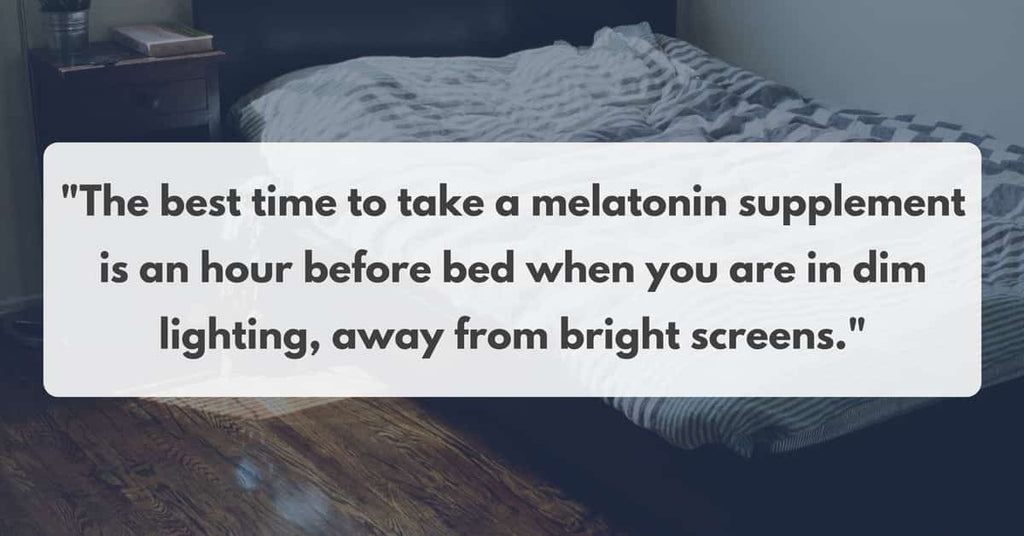Your Cart is Empty
COLLECTIONS:
SPECIAL OFFERS:
LEARN:

The Case for Low Dose Melatonin
March 04, 2024 6 min read
Melatonin is a natural compound that has a long, interesting history.
It was first discovered by 16th century Greeks and found to help the body fall asleep and stay asleep.
Since its initial discovery, we have been able to isolate Melatonin and create nighttime sleep aids.
You’ve probably heard of melatonin supplements if you have trouble falling asleep at night - and rightfully so, as it's the most commonly recommended sleep aid for those struggling with sleepless nights.
Traditionally, melatonin supplement dosages have been marketed as "the more, the better", but new research shows that low dose alternatives could lead to better results (1).
Below we'll dig into what melatonin is, how it impacts sleep, and the best dosages for improved sleep quality.

What is Melatonin?
Melatonin is a natural hormone released from the pineal gland when your eyes are exposed to darkness.
When melatonin is released into your body, it signals that it's time to shut down for the night. This is why your body naturally tends to get sleepy at nighttime.
Since melatonin is released at nighttime, this is why it is often referred to as the "hormone of darkness".
That being said, melatonin plays a key role in regulating your body's sleep patterns.

How To Tell If You Have Melatonin Deficiency?
For many people, the body's natural nightly melatonin release doesn't occur properly.
Often times this is due to exposure to bright lights at night (from TV or iPhone screens). This lack of melatonin leads to sleepless nights.
Additionally, research suggests that those who struggle with falling asleep may have a melatonin deficiency or malfunction caused by your own body’s inability to produce and/or release melatonin (2).
In both cases, supplementing with Melatonin is a great way to give your body what it needs to sleep at night.
If you’ve taken melatonin before, you know that it works well for getting you sleepy and helping your body to initially fall asleep.
However, there can be some problems with this supplement depending on its quality and the quantity that you take.

It’s easy to get caught up in the idea that "a natural supplement is harmless to take, so you can take however much you want if it works for you".
However, that is not the case because too much of any substance (however good) can lead to issues.
This is why low-dosage melatonin is a great alternative to the mega dosage melatonin that you often see at your local drug store.
Too Much Melatonin is Counterproductive
Naturopaths and doctors who practice alternative medicine are now recommending low-dosage melatonin for a reason.
They are starting to realize that micro doses of melatonin can be just as effective as large doses, and lead to better long term results.
Research has proven that longer-term use of melatonin supplementation is most beneficial when a low dosage of under half of a milligram of melatonin is consumed each day (1).
Too much melatonin can cause an abnormal shift within the natural processes in your brain. It’s thought that dosages over 1mg can cause your body to develop an unhealthy dependency on the supplementation of melatonin.
It seems that the best way to promote optimal health is to assist your body in restoring natural functionality, rather than creating a "supplemental dependency".

The human body can be physically or psychologically addicted to both pharmaceutical and natural substances.
Especially when you take it every day, your immune system is designed to respond and adapt to all types of environmental changes in your body.
What Happens When You Have Too Much Melatonin?
When your brain notices that there is extra melatonin present in your body, it stops producing it naturally within the body.
In people with healthy, functioning sleep mechanisms, melatonin is produced when your eyes aren’t exposed to light, whether it’s from the sun or your computer screen.
Since there’s already too much melatonin present (over 1mg), your brain believes “okay, there’s already too much. Let’s stop producing the melatonin so that we don’t negatively affect other mental functions”.
You are manually providing the hormone required to fall asleep, so there is no need to produce more. Your body is smart and it knows that too much melatonin can have undesirable effects.
This affects your body's natural ability to produce and release melatonin. Over time, this can lead to dependency on melatonin supplements or other, harsher sleep drugs.
Side Effects of Too Much Melatonin

When you take too much melatonin, which can be noticed in doses above 3mg, you will likely encounter these uncomfortable symptoms:
- Excessive drowsiness that doesn’t help you fall asleep
- Reducing overall quality of sleep
- Falling asleep, but waking up a few hours later and not being able to fall back asleep
- Grogginess the following morning
- Headaches the following day
- Uncomfortable dreams or nightmares
- Night sweats or bed-wetting
- Hot flashes during the night that may wake you up
- Aches, nausea and dizziness
- Irritability the next day
These are all impediments of quality sleep. You can encounter many other types of symptoms as well depending on your unique state of health.
Overall, it appears that too much melatonin is simply counterproductive and does not support longterm restorative sleep.
Perhaps too many troubled sleepers are too impulsive with their sleep supplements and use them inappropriately. They may be caught up in the idea of “whatever knocks me out.... I just need some sleep".
However, that perception does not highlight the real issue that they are having.

The Goal Is Rejuvenating Sleep, Not Simply Falling Asleep
The focus should not be on falling asleep, it should be on getting deep, restorative sleep. Falling asleep is only half the battle. In addition to falling asleep, you will want to wake up the next morning rejuvenated and ready to be productive.
That’s supposed to be the ultimate end goal right?
We mustn’t forget that.
Some people do, though, and they take the highest dose of melatonin from their local store (around 10mg per tablet). People who take this dosage often report that they fall asleep quickly, but then wake up 2-5 hours later and cannot get back to sleep.

The quality of sleep during those few hours is usually very low, meaning you have to face the entire day with lack of sleep.
Doesn’t that seem highly counterproductive?
How Much Melatonin Should You Take?
Alright, so what’s the ideal dosage for long-term use of melatonin? The simple answer is: start small.
When you start small, you can gradually add more melatonin over time. This allows your body to finds its "sweetspot".
Utzy believes this to be the truth, which is why we offer a low dose melatonin supplement called Micro Melatonin.
This small dosage melatonin makes it easy to take a micro dosage of melatonin. This gives your body a gentle amount of melatonin, which helps to nudge your natural system (versus taking massive amounts of 10 mg at a time).

With a small dose melatonin supplement like this, you can control your intake much more easily and effectively. If you find that one of the small doses doesn’t seem to work, you can just try two and so on.
Also, one of the beauties of Micro Melatonin is that it is such a small dose that you can take it nightly. There are no worries of interfering with your body's natural supply.
When Should You Take Melatonin For Sleep?

When supplementing with this natural sleep aid, timing is important. You should remember that your brain produces melatonin itself naturally when your eyes are exposed to darkness.
If you supplement with melatonin too early--i.e. before the sun begins to set--you could risk throwing off your natural circadian rhythm.
Rather than fighting against the natural processes of your body, you should assist it. Therefore, the best time to take a melatonin supplement is an hour before bed when you are in dim lighting, away from bright screens.
This helps to simulate a natural sunset environment, which further helps your brain to start slowing down and begin preparing for rejuvenating sleep.
Other Benefits of Melatonin:
Melatonin has a few other health benefits, you can read on below.
1. Melatonin is Highly Beneficial for Jet Lag
Melatonin is also very helpful for those suffering from jet lag after long flights. In this case, your brain is confused about what’s going on because you quickly changed your location on the planet relative to the sun’s light.
Melatonin may be able to help signal your brain to naturally adapt to this change so that you can get to sleep without having to stay awake for two days straight.
Doctors recommend that you take between 0.25 and 3mg for treating jet lag.
However, the smallest dose should still be enough to ease you into sleep. Melatonin is a great supplement to bring with you when traveling long distances where the time zone changes.
2. Melatonin is Key For Older Adults
Research also shows that natural levels of melatonin production start to decline in those over sixty (3). Elder generations will benefit greatly from this natural sleep supplement because of this, especially in micro doses.
The pill size is small and easy to swallow, as well as being gentle on your natural sleep patterns, unlike aggressive sleep medications.

In Closing:
No matter who you are, you can benefit from having a natural sleep aid like melatonin on hand, just in case you need a little assistance with falling asleep.
We all run into those days when we sleep in too late or don’t exercise and have trouble resting the following night.
Thankfully, we have found these ways to naturally curb common sleep issues.
________________________________________________________________________

Daniel Powers (co-founder of Utzy Naturals) is a health fanatic and writer. He has a Masters Degree in Herbal Medicine. He's obsessed with learning how to live a healthier, happier life.
________________________________________________________________________
1 Response
Leave a comment
Comments will be approved before showing up.
Also in Health
Subscribe
Sign up to get the latest on sales, new releases and more …
Join the Utzy Naturals Club!
Sign up and get the latest on sales, new releases, and more...










Annette
October 25, 2022
Really helpful